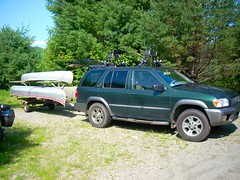
He got out of the car to strap the canoes down for the trip upriver. Moments later, he came dashing into the house, breathless. “Bees!” he declared. There’s a beehive in the canoe!”
Sure enough, I was able to get close enough to take this picture of a perfect beehive, sitting snug and protected from the elements on the floor of one inverted canoe. A cloud of angry and confused bees swarmed around the area, unsure of the threat, but perfectly ready to sting anything that moved.

Thankfully, D* and I were dressed in hooded sweatshirts and long pants as mosquito protection, so the bees weren’t able to find any skin. We got away without being stung.
We hatched a plan to remove the nest. Near his camp was a long logging road that had been cut through the woods. It’s currently being used as part of the Maine trail system. We jumped into the car and took off, bouncing down the muddy unpaved trail, attempting to shake off the beehive.
At the end of the trail, D* got nervously down on his knees and discovered that the beehive was gone.

We drove back slowly, looking for the beehive, and found it about half a mile away. Not a bee in sight.

Flush with our success, we returned in triumph to the camp. D* returned to his task of strapping the canoes down. When he was finished, he reached into his pocket and discovered that he couldn’t find the ring of keys that would unlock the hitch. They were gone, which meant he couldn’t remove the trailer from the hitch.
“Oh well, no problem,” he told me. “I can just remove the ball from the hitch mount, which will accomplish the same thing.” But his face darkened as he struggled to remember what he had done with the key ring in the excitement of the bee incident.
We loaded into the cars for the canoe trip, which was fun and exciting (more on that later), and returned to the camp for cold beer.
D* is one of those guys who can’t stop chewing on the edges of a problem. For a couple of hours, while everyone else was enjoying themselves, he wandered around aimlessly, checking the pockets of clothing, moving things from shelves, and returning again and again to the car. Even beer wouldn’t settle him down.
Finally, he approached me. “I think I know what happened,” he said. “I think I left the keys in the hitch lock and they fell out while we were trying to lose the beehive.”
“Uhh, we must have driven three miles trying to bounce that beehive loose. Do you really expect us to walk that distance – and back - through those mosquitoes?” I asked.
“Just to the end of the driveway,” he begged.
So we went outside into the swarm of hungry mosquitoes and started off on a brisk walk down his long, unpaved driveway. We agreed to scout the weedy edges first, and then the middle of the driveway on the return trip.
We found nothing on the way out. But on the way back, D* spotted the key ring, which had been broken (probably by being run over) and had only one key on it.
“This solves my problem!” he exclaimed. “The other keys aren’t important. But…”
“But what?” I asked, brushing mosquitoes off my eyelids. “The problem is solved, right? Let’s get back to the camp!”
“There was a bottle opener…” he mumbled.
“I’ll buy you another bottle opener! A really nice one!” I sputtered, anxious to sprint home.
“I mean, we should be able to find the rest of the keys if we can spot the bottle opener. Let’s just keep looking.”
With a sigh, I followed him a little further, which cost each of us another fluid ounce of blood, and then D* spotted the bottle opener – but no keys.
Ten feet farther along, I found the remaining keys. As it turns out, those were the keys he needed; he had misidentified the first key.
So it all turned out well, and we backed the canoe trailer into the weedy patch so a new generation of bees can enjoy a year of undisturbed honey production.

1 comment:
As your personal fact checker - it's only 1 mile to the dam - but the bee story is still good and we found yet more keys when we were walking back from picking yet more raspberries the next day! - N
Post a Comment